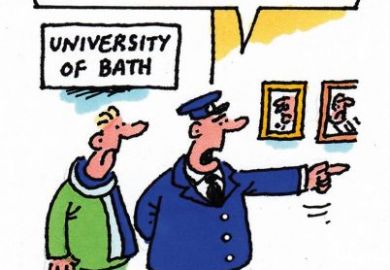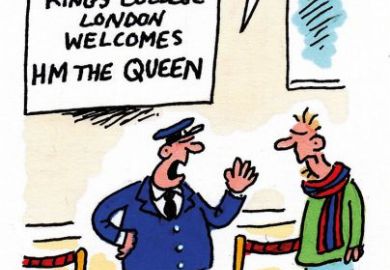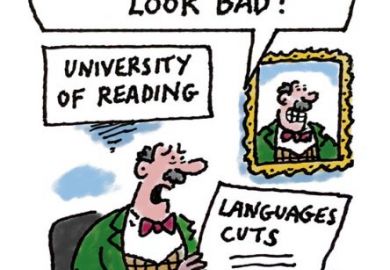
What to do when your wealthy royal supporters turn out to be homophobic dictators after all? Both King’s College London and the University of Aberdeen made swift moves to condemn anti-gay laws introduced by the Sultan of Brunei this week: each announced an immediate review of the honorary degree that it has awarded him. The University of Oxford was slower to respond to the legislation, which makes gay sex between men punishable by death. An online petition calling for the university to rescind an honorary degree awarded to the sultan reached 50,000 signatures before Oxford announced that it, too, would review its position. The university said it shared the “international revulsion” associated with the new laws but insisted that nobody had the right to “summarily” rescind the degree. All eyes are watching Oxford while it evaluates the true price of friendship.
Bad news for another group of objectionable wealthy men: a “sugar daddy” website popular across Europe has been banned, and its Norwegian owner was prosecuted in Belgium this week. Adverts for the website Rich Meet Beautiful appeared outside university campuses in Brussels last year, The Guardian reported, inviting female students to “improve your style of life [by getting] a sugar daddy” – that is, an older man to pay cash and gifts in return for company. Campaigners have criticised the website as “reduc[ing] students to sexual objects”, and owner Sigurd Vedal faces charges of debauchery, public incitement to debauchery and violating anti-sexism laws. The Université Libre de Bruxelles is seeking €5,000 (£4,304) in damages, which it will dedicate to “an institution that fights against sexism and prostitution”. But where one website falls, several dozen more follow.
More tough rulings this week come from Down Under, with the Australian government announcing new proposals for a law against contract cheating. Essay mill operators could face two years’ jail time if the draft legislation goes through, with individuals found to be profiting from writing exams or essays also facing fines of up to A$210,000 (£114,000). The proposal is modelled on a similar move by New Zealand to eradicate contract cheating in its universities and helps to set the bar for more nations serious about cheating. “We will make contract cheating a crime, sending a very clear message that cheats do not prosper,” said Australia’s education minister, Dan Tehan.
It has taken some time, but seven pioneering female scientists are finally to receive their graduation certificates – no fewer than 150 years after they finished their degree courses (and people say PhD students take too long to complete these days). Sophie Jex-Blake, Isabel Thorne, Edith Pechey, Matilda Chaplin, Helen Evans, Mary Anderson and Emily Bovell were the first women in Britain to matriculate, but they were famously prevented from finishing their courses at the University of Edinburgh with their male peers. “The men made life as difficult as possible for the Edinburgh Seven, shutting doors in their faces, howling at them and behaving aggressively,” the university’s website states, adding that riots broke out when the women attempted to take their exams. A ceremony will take place for them in July to commemorate the 150th anniversary year of their joining. Better late than never, we suppose.
Is the US college admissions scandal now affecting house prices? According to The Boston Globe, businessman Jie Zhao paid almost $1 million (£760,000) for a house in the Boston area then owned by the Harvard University fencing coach Peter Brand. But the house had been valued at only about half that, and Mr Zhao sold it at a loss 17 months later without ever having lived there. Attention has focused on the fact that Mr Zhao’s son was considering applying to Harvard and joining the fencing team – a goal that he subsequently accomplished. While the case bears some similarities to the fraud cases being pursued by the FBI, which last month accused the parents of at least 33 students of paying bribes to help their children win admission to elite US universities, often by finding sports coaches to claim the applicants as potential team members, Harvard responded that all athletes are interviewed before admission. Mr Zhao, meanwhile, denied any wrongdoing, stating that he had bought the house as a favour to Mr Brand, a friend, and paid little attention to the prices involved.
Register to continue
Why register?
- Registration is free and only takes a moment
- Once registered, you can read 3 articles a month
- Sign up for our newsletter
Subscribe
Or subscribe for unlimited access to:
- Unlimited access to news, views, insights & reviews
- Digital editions
- Digital access to THE’s university and college rankings analysis
Already registered or a current subscriber?



